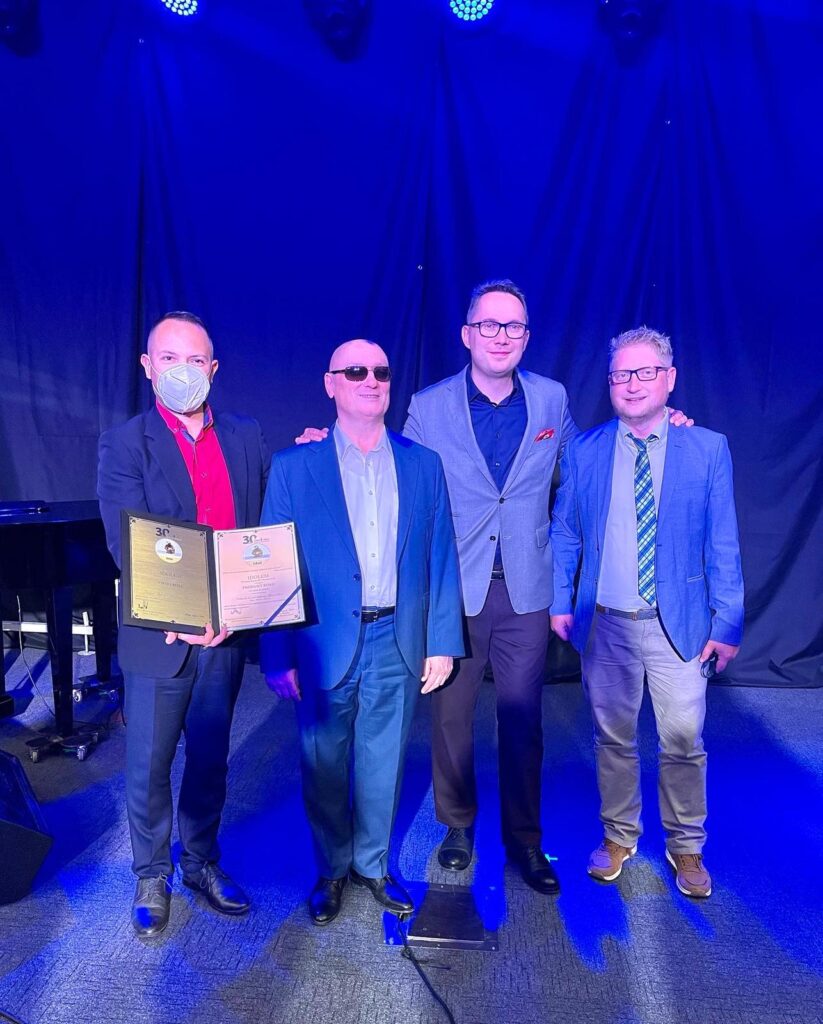With the worldwide implementation of the tactile alphabet of colors, the Scripor Association aims to “break down” an old barrier faced by individuals with various visual impairments, namely the inability to cope with challenges in various areas such as education, nutrition, technology, or sports. Tudor Scripor, a resident of Cluj and the inventor of the alphabet, seeks to apply its usefulness to products designed for the visually impaired through Accessibility Workshops.
After the Scripor Association was nominated for the invention of the tactile alphabet of colors for the blind, several representatives were invited to Poland on September 13 for the World Idol 2021 event. During the conference, three categories of awards were presented: Personality of the Year, Organization of the Year, and Product of the Year. Thanks to the recognition given by the international visually impaired community, the members of the Association felt rewarded for their hard work.
“After the conference, visually impaired individuals came to us and told us that among all the projects submitted, they voted for ours. I found it very beautiful on their part because it is very difficult to convince a foreign community that we are truly creating useful projects. We won first place in the Organization of the Year category with the Scripor Alphabet Association and second place with the Tactile Alphabet Learning Manual as the Product of the Year 2021, with just a 17-vote difference from first place. We were also presented as the organization with the greatest impact on the visually impaired community.
I don’t think it even mattered which country we were from. People voted for us because they realized that this is a project created for the community. So far, we have put everything we have created into practice, and at the moment, we are in the phase of implementing the alphabet on products specifically designed for the visually impaired. The usefulness of this alphabet will be demonstrated once again in the Accessibility Workshop during the international WUKF Karate Championships in Cluj-Napoca,” explained Tudor Scripor, the inventor of the Tactile Alphabet of Colors for the blind, to Servus Cluj.
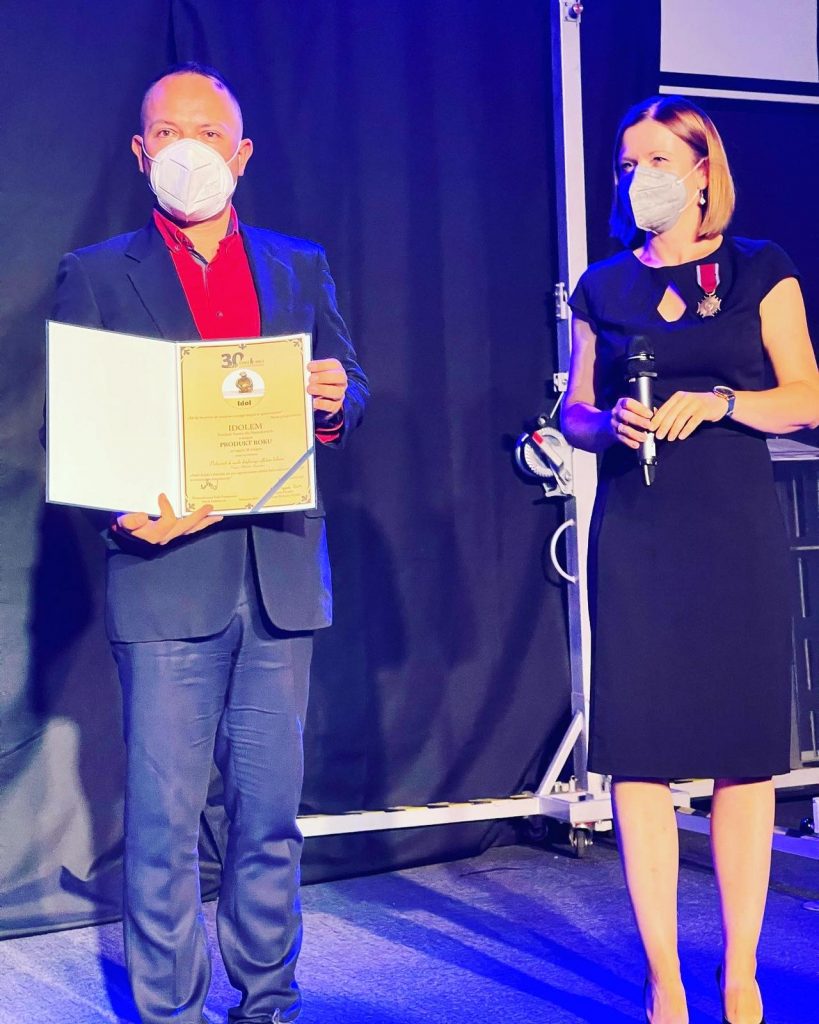
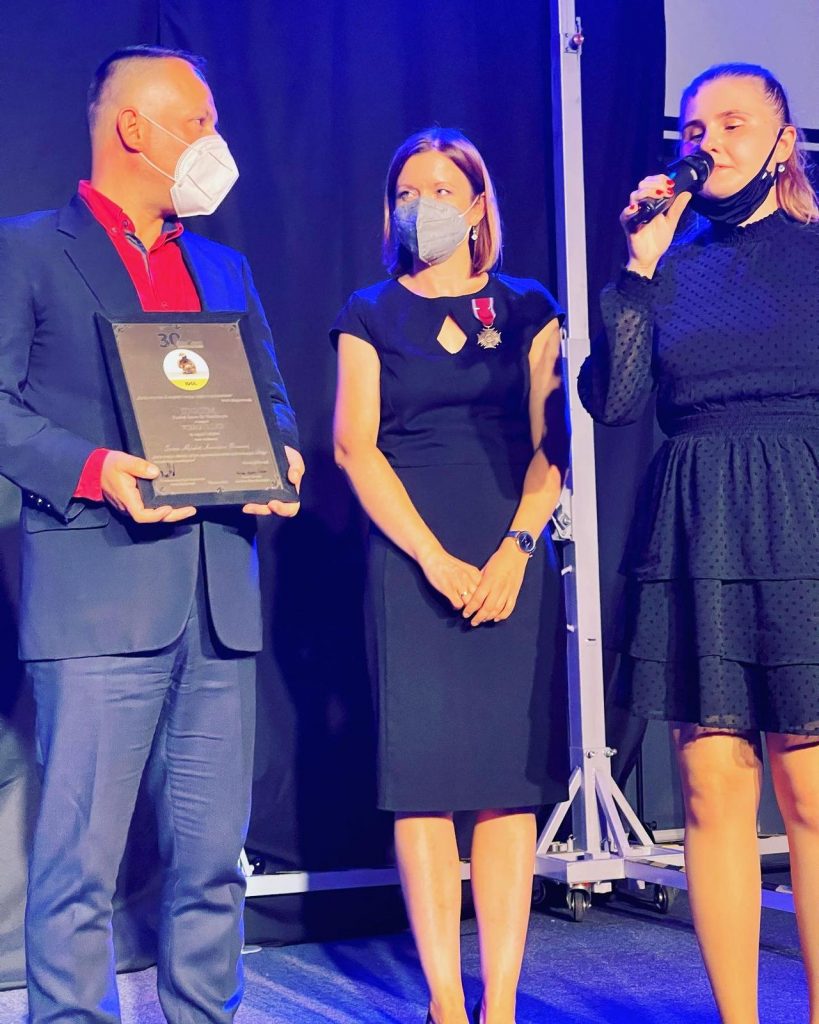
Where did the idea for organizing Accessibility Workshops come from and what is their purpose?
Tudor Scripor believes that the Accessibility Workshop was born out of the desire to raise a strong alarm signal about the lack of accessible products and services for people with disabilities (such as wheelchair users, visually impaired individuals, or those with intellectual disabilities) in Romania. These individuals are also deprived of certain rights.
At the first edition of the workshop held in Bistrița (Understanding Barriers & Social Inclusion), they specifically invited Anca Dragu, the President of the Senate: “Mrs. Anca Dragu responded to our invitation right away. Moreover, she invited us to participate in the creation of an accessibility platform to change and improve Law 448, which applies to all people with disabilities in Romania. We responded positively, expressing our desire to be part of the team working on this change,” adds Tudor.
The Accessibility Workshop, organized today, September 24, will focus entirely on the sports domain. The third edition of the workshop will address the food industry: “For example, both menus and packaging are not accessible to visually impaired individuals. It is very difficult for them to go shopping. Here, it is not only the tactile alphabet of colors that needs to contribute, but also the major retail chains. Firstly, they lack ramps for wheelchair users. Additionally, websites are not accessible, and we want to improve that,” emphasizes the inventor of the Tactile Color Alphabet.
To help people understand a specific situation where visually impaired individuals are putting their lives at risk, Tudor provided a small example related to the packaging of a 1-liter water bottle.
“With the same packaging, in an identical form as a 1-liter bottle, antifreeze is also present. This is very dangerous for a person with visual impairments because they can easily confuse the packaging. Both liquids are odorless, but antifreeze is deadly. There are solutions, and we have them, to help visually impaired individuals differentiate between the two,” adds Tudor.
Everyone, without exception, should have the right to know what they are buying. Hidden cameras in a store recorded people’s reactions when they encountered the lack of accessibility. By watching this video, you will understand the reality that visually impaired individuals face when they go shopping.
Video link:
https://www.facebook.com/watch/?v=404432074604055
If you have wondered why the Scripor Alphabet Association strives to “simplify” the lives of visually impaired individuals, here is the answer. This Association is a volunteer-based NGO. Members do not pay any membership fees because the contribution of each individual is considered “sufficient” and does not need to be quantified, according to the project initiator, Tudor Scripor. They offer volunteer diplomas, and the activity of any member can be proven at any time.
There are companies that support them to the best of their abilities; however, like any NGO, the members try to attract as many sponsors as possible to carry out all their projects. Additionally, because they are action-oriented and eager to work hard, the leadership of the Association appeals to volunteers.
“I would like to appeal to all those who wish to volunteer for this project. They should know that they are more than welcome! We need volunteers in the communication field, psycho-pedagogues, teachers, architects, people from all fields. Currently, we have approximately 100 people enrolled for such a large project. Many have joined us from abroad, from countries such as the Czech Republic, England, Poland, the United States, or India. They saw the applicability and wanted to get involved. These are people who want to use their time in a constructive way and offer their experience,” says Tudor Scripor.
See here all the details about how such a Tactile Color Alphabet for the visually impaired works: https://www.servuscluj.ro/foto-clujeanul-care-a-inventat-alfabetul-culorilor-pentru-nevazatori-nominalizat-la-premiul-world-idol-2021-nevazatorii-pot-distinge-culorile-hainelor-prin-noua-aplicatie/
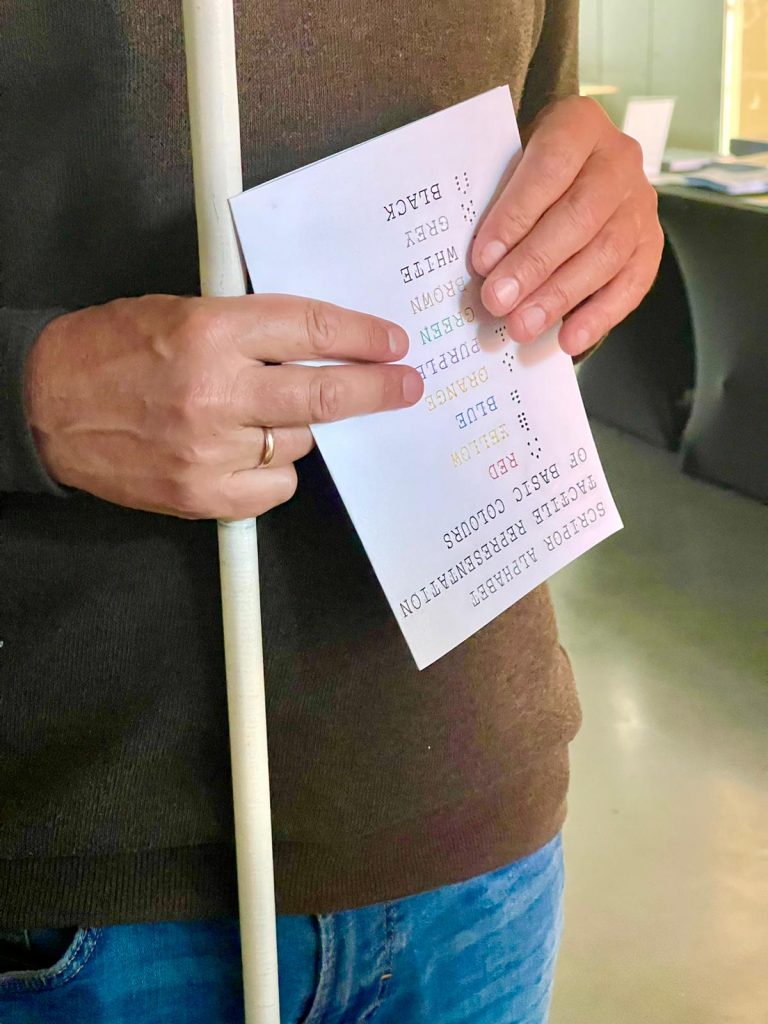
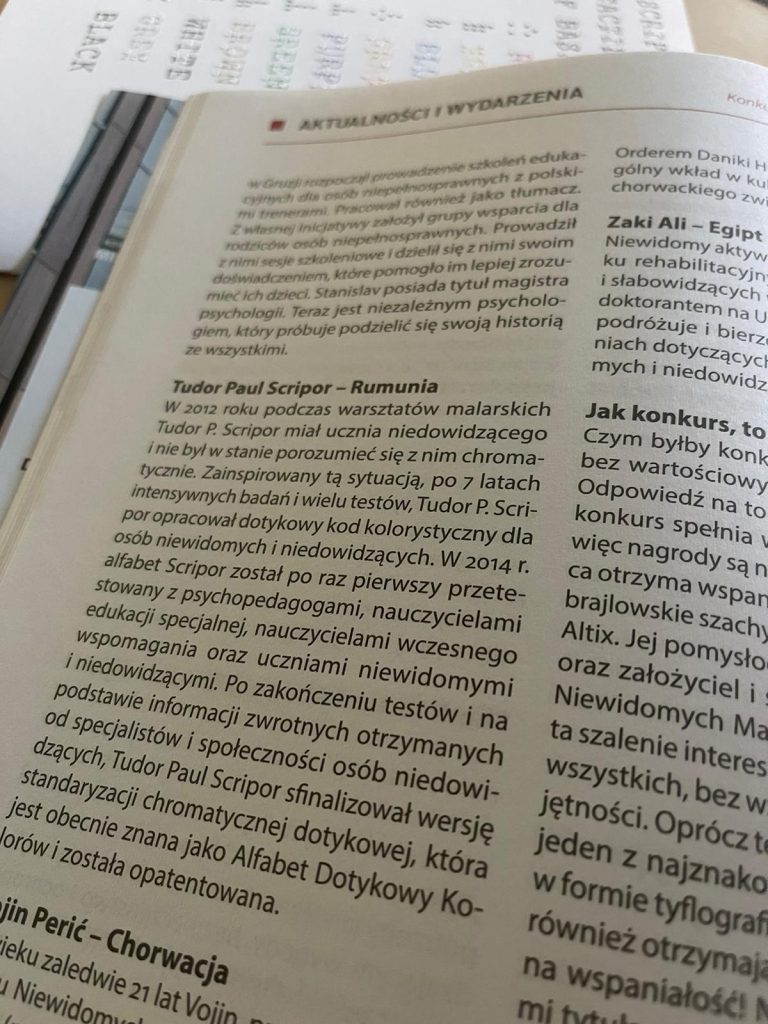
Inclusive Access is a social enterprise in partnership with the Scripor Association. The newly established company, launched this spring, does not directly provide benefits to individuals with disabilities. Their target customers are primarily institutions and companies.
This social enterprise offers consultancy services, auditing, signage production, implementation support, and everything related to assistive devices for making spaces accessible wherever there are deficiencies in providing services and access to people with disabilities. Inclusive Access also aims to support public institutions, the public sector, and the private sector in their efforts towards accessibility.
“In the services and products we develop, we integrate the tactile alphabet of colors. That’s why we have established an official partnership between Inclusive Access and the Scripor Alphabet because we are on the same path. Inclusive Access started from a problem we realized late: accessibility for people with disabilities. We initially focused on the visually impaired and then realized the need for all types of disabilities. We support anyone who wants to make products accessible for people with disabilities or integrate them into the workplace, providing assistance throughout the accommodation process,” explained Andrei Nicu, the manager of Inclusive Access.
After supporting the Accessibility Workshop in Bistrița, they discovered that there are 18,000 people with disabilities in that area: “Everyone was surprised and wondered where they all are, why we don’t see them on the streets. The reason is that they are not integrated. Accessibility is the first step to integration,” added the manager of Inclusive Access.
In today’s Accessibility Workshop in Sports, there will be present Paralympic athletes as well as instructors who practice karate.
“We chose karate because in this sport, the belt represents a rank and progression, and color is very important. If they can’t distinguish colors, they won’t understand each other’s achievements. Athletes will be able to identify their belts through the Tactile Alphabet of Colors.
Furthermore, we will learn how karate instructors have overcome these challenges and successfully integrated the division of people with disabilities into their clubs. We want them to be examples for other clubs that should embrace more people with disabilities. We aim to eliminate obstacles and include them in activities,” stated Andrei Nicu.
People with disabilities are grateful that someone is fighting for them as they usually don’t step forward themselves: “They are not among those categories who demand their rights. That’s why we decided not to establish an NGO but also not an LLC; instead, we created a social enterprise where we employ people with disabilities to help individuals of their kind. They work for their own benefit, and that’s the cycle. The conclusion is that people should see accessibility as something normal,” concluded the manager.
According to statistics provided by the European Blind Union, there are over 100,000 blind people in our country and approximately 30 million in Europe.
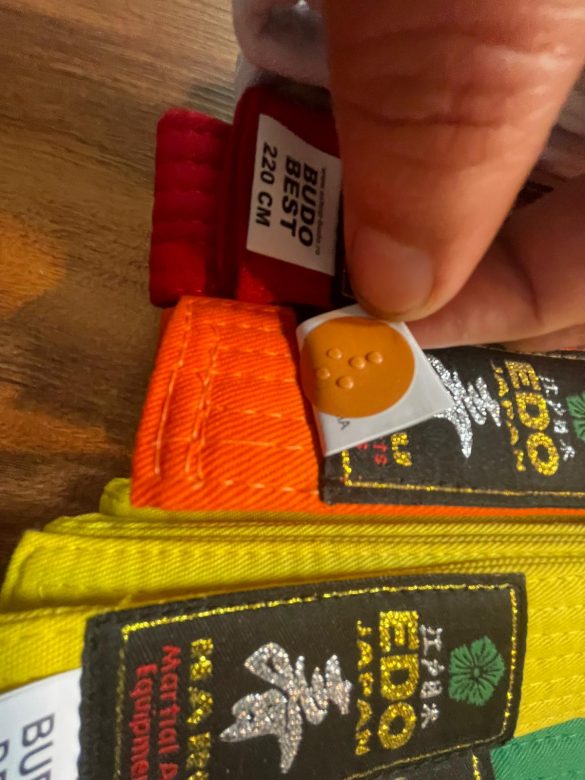
Accessibility Workshop – Accessibility in Sports
Date: Friday, September 24th, at 7:30 PM
Approximate Duration: 2 hours
Event: 9th WUKF WORLD KARATE CHAMPIONSHIPS CLUJ-NAPOCA
Location: The competition’s award tent – Horia Demian Sports Hall, Cluj-Napoca
Opening: 10-15 minutes
Guest Introduction: 10-15 minutes
Guest Speeches: 10-15 minutes per guest
Personal perspectives and overview on the accessibility of sports, how they succeed through their function or role in producing positive effects in the lives of people with disabilities.
– The importance of sports for people with disabilities and personal motivation
– Previous experiences and future plans in sports accessibility
Participants are invited to engage in informal discussions with the guests to exchange experiences, establish working relationships, and get to know each other.

